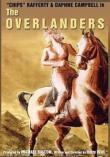AustLit
The material on this page is available to AustLit subscribers. If you are a subscriber or are from a subscribing organisation, please log in to gain full access. To explore options for subscribing to this unique teaching, research, and publishing resource for Australian culture and storytelling, please contact us or find out more.
Film Details - Ealing Studios , 1946
Producers:
Michael Balcon
Ralph Smart (Associate Producer)
Production Companies:
Ealing Studios
Director of Photography:
Osmond Borradaile
Editors:
Inman Hunter
Composer:
John Ireland
Cast:
Incl. Chips Rafferty (Dan McAlpine), John Nugent Hayward (Bill Parsons), Daphne Campbell (Mary Parsons), Jean Blue (Mrs Parsons), Helen Grieve (Helen Parsons), John Fernside (Corky), Peter Pagan (Sailor - aka 'Sinbad'), Frank Ransome (Charlie), Stan Tolhurst (Manager), Marshall Crosby (Minister), John Fegan (Police Sergeant), Clyde Combo (Aborigine Jacky), Henry Murdoch (Aborigine Nipper).
Release Dates:
1. 27 September 1946 (Lyceum Theatre, Sydney - world premiere). Released throughout the United Kingdom beginning 2 December 1946. Other commercial release dates include New York City, USA (19 December 1946); USA (26 December 1946); Austria (27 June 1947); Sweden (28 July 1947); Finland (29 August 1947); France (5 September 1947); Germany (26 September 1947); Italy (10 January 1948); Hong Kong (7 October 1948); Japan (18 October 1948).
2. Released on videocassette format in 1989 by Virgin Vision. Released on DVD format in 2009 through Optimum Releasing. Polygram Video also released the film on videdocassette in 1995 as a twin release (with the 1948 version of Eureka Stockade).
Location:
- Central Australia, Northern Territory (Australia), and Ealing Studios (London)
Notes:
1. According to Andrew Pike and Ross Cooper, critical reaction to The Overlanders was 'uniformly enthusiastic' and it was included in many 'Top Ten' lists around the world, becoming a perennial favourite in both Australia and Great Britain in particular (p.268). It was also the first Ealing film to receive widespread distribution in Europe.
2. Also known as Das Große Treiben (Germany); Donnernde Hufe (Austria); La Route est Ouverte (France); Oi Thriamveftai (Greece); Täyttä Laukkaa (Finland).
3. Further reference: Andrew Pike and Ross Cooper. Australian Film 1900-1977, A Guide to Feature Film Production (1980, q.v.), pp.267-268.
Settings:
- Queensland,
- Western Australia,
- 1940s



